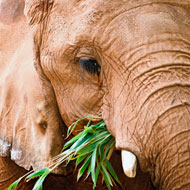Report uncovers ivory supply chain

Born Free USA has called for governments, non-governmental organisations, conservationists, law enforcement agencies and the private sector to work together to target the ivory supply chain between Africa and Asia as poaching and trafficking reaches the highest level in 25 years.
A new report commissioned by the Born Free USA has uncovered the ivory supply chain from poached African elephants to markets in Asia and found Chinese traffickers are present in virtually every African range state and operate at nearly every point along the supply chain, with exception of the initial poaching.
Across Africa, as much as five to seven per cent of the elephant population is being slaughtered annually and trends point to an expanding and increasingly sophisticated trade that is closely tied to conflict, organised crime and political corruption.
The report, 'Out of Africa: Criminalisation of the African Ivory Trade', provides a detailed examination of the supply including how illegal ivory flows primarily in containers through the international shipping system, that the large majority of all of the illegal ivory is accounted for within a small number of transactions, with three key ports - Mombasa, Dar es Salaam and Zanzibar on the east coast of the continent - exiting the majority of shipments, pointing to the need for more carefully-targeted enforcement efforts.
The study also highlights how ivory and wildlife trafficking networks operate within a black market that has a high degree of convergence with other forms of organised crime activity, with traffickers relying on, and helping to enrich, facilitators who are interwoven into the systems that enable terrorist financing, drugs, weapons, and human trafficking.
Adam M. Roberts, CEO of The Born Free Foundation and Born Free USA, said; “The ivory trade is operating today at the highest level since the 1989 commercial ivory trade ban. Our investigation reveals that between 2009 and June 2014 there were more than 90 large-scale ivory seizures, collectively weighing almost 170 tons that bear the hallmarks of international organised crime. This would amount to approximately 229,729 elephants killed and trafficked in fewer than six years. The greatest challenge to combat the wildlife trade is a lack of adequate information on how the trade functions. Our report seeks to bridge that gap, providing actionable insights, and replicable and scalable processes, to help mobilise tangible action for the policy, intelligence and law enforcement communities."
China is the largest market for illegal ivory and recent surveys have concluded that Chinese nationals, including tourists, migrant workers, and visiting businessmen, are primary customers upholding the markets today, with illicit networks liaising with African poaching gangs to acquire and consolidate ivory, consign cargo, and set up shell companies, and then move the product through Chinese entry points for sale to processing facilities.
Varun Vira, Chief of Analysis at C4ADS and co-author of the report, said; “The ivory trade is worth billions of dollars but is still talked about as if it were an unprofessional, disorganised, and artisanal industry, of concern only to conservationists. In reality, it is a highly organised, complex global crime that has avoided consequence for decades. However, our report reveals that there may be as few as 100 large-scale ivory containers moving annually that drive the vast majority of the entire illegal trade. Focusing efforts on intercepting these containers and tracing back their owners and facilitators can have a real impact on the trade."



 The Greyhound Board of Great Britain has published new vaccination guidance, with all greyhounds registered from 1 January, 2027 required to have the L4 leptospirosis vaccination, rather than L2.
The Greyhound Board of Great Britain has published new vaccination guidance, with all greyhounds registered from 1 January, 2027 required to have the L4 leptospirosis vaccination, rather than L2.